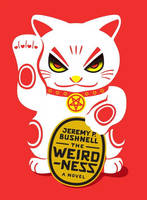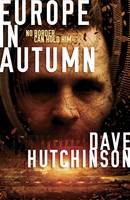Today I’m rounding up a couple of recent reviews that I’ve had published on other sites. First, I am back at Strange Horizons with a look at Dave Hutchinson‘s new novel, Europe in Autumn (published by Solaris). This is a tale of espionage set in a future Europe which has fractured into myriad small polities – but there’s a quietness to the whole book that I find very interesting. Europe in Autumn has an engagement with form and tone that I’d love to see more often in contemporary genre science fiction. You can read my full review of the novel here.
***
I also have a new review up at We Love This Book, of Jeremy P. Bushnell‘s debut novel, The Weirdness (published by Melville House). Here it is:
 Jeremy Bushnell’s first novel is the tale of a man finding his way in a world that turns out to be stranger than he ever imagined.
Jeremy Bushnell’s first novel is the tale of a man finding his way in a world that turns out to be stranger than he ever imagined.
Billy Ridgeway is a thirty-year-old aspiring writer who wonders at the weirdness of everyday life: isn’t it just odd that you can walk into a bodega in New York and buy bananas? And why exactly did people start keeping animals as pets? One day, the Devil visits Billy’s apartment and offers him a deal: stop a warlock who’s trying to unlock the secrets of a magical artefact that could destroy the world, and Lucifer will ensure that Billy’s book is published (short stories are such a hard sell, after all). Billy doesn’t quite agree at first, but the Devil has ways of persuading him; and so begins Billy’s journey of adventure and discovery.
Perhaps the greatest strength of The Weirdness is its sheer exuberance (or cheek), as Bushnell gleefully piles absurdity on top of outlandishness. Barely any part of Billy’s life remains ordinary, so it’s not so much a case of suspending your disbelief as just abandoning it and going with the flow. Yet there’s a certain distancing effect at play, as though all the magic is just a sideshow; at the heart of The Weirdness is the story of Billy finding out what really matters in life – and what matters is much more down to earth. For all that Bushnell’s novel is a fantastical romp, it doesn’t lose sight of the human dimension.
(The original review is here.)

Recent Comments